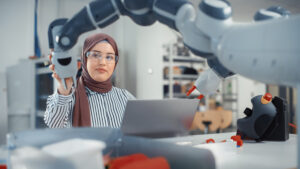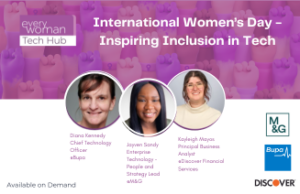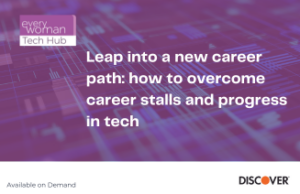Harbouring a passion for the environment from a young age, plus a love for the hands-on learning that science and engineering offered, Professor Marcelle McManus has forged a successful career in what is perhaps the most important field of study that exists today: how to save the planet.
Her work as both Professor of Energy and Environmental Engineering at the University of Bath, and Co-Director of Centre for Sustainable and Circular Technologies won her the Academic Award at the 2020 everywoman in Tech Awards.
We caught up with Marcelle to find out more about what creating a more sustainable world entails, what winning her Award means to her and why fighting inequality is such a crucial part of her day job…
I always liked finding out how things worked and loved learning in a hands-on way, which drove me into science and engineering…
I also had a passion for the environment from a very early age. I was always worried about sustainability, but when I talked to people about climate change, they would look at me as if I was mad. Now, it’s driving absolutely everything. I had a geography teacher who was passionate about the environment and he infused us all with a desire to make things better and think about the consequences of our actions. That stayed with me.
Now I’m a Professor, I have students getting in touch to thank me for the things I taught them, and that’s just a wonderful feeling…
I’ve worked with some amazing people who have gone off to do amazing things. I’m so proud to even have had any little bit of influence. I’m also proud of the area I work in — reducing environmental impact with a focus on greenhouse gases and decarbonisation. I think it’s one of the most important topics in the world.
At The Centre for Sustainable and Circular Technologies, we try to bring sustainability into tech at every level…
In order to do that we need to have scientists, engineers, economists and policymakers all working together. We look at processes and systems such as material production – some materials we want to be able to break down very quickly, like some plastics, others we want to stay around for a long time. We look at how we can capture carbon in some parts of the industrial process, and how we can reduce greenhouse gases. I’m all for the whole system — I don’t want to reduce carbon impact in one area and have different impacts down the line; more air pollution for instance.
I was hugely honoured to win the Academic Award at the 2020 FDM everywoman in Technology Awards…
I still can’t believe it! It comes with opportunities, as it has given me more access to new connections and networks, but more responsibility also. Like it or not, people do look at you as a role model if you start winning Awards. It makes you an ambassador for women in STEM; the person happy to represent others either on an individual or systemic level. I was doing this already, and now feel a duty to do even more to make the world of science and engineering more inclusive.
One of the main obstacles I’ve come across in my career is not being viewed as a ‘proper’ engineer because I’m working on sustainability, climate change and energy provision…
To me, keeping the climate from spiralling into disaster is pretty important, but because many people still see engineering as building planes or cars, in the engineering world I’ve been seen as an outsider, which is compounded by my gender. Sometimes there has been a bit of a battle to be taken seriously, but in order for more women to come into STEM it’s the responsibility of all, not just senior women, to fight for this broader equality. Many people, including many of the professional institutes and academies are tackling it, but in order to be able to address the wide challenges humanity faces we need all sorts in engineering. We also need to realise that engineering is the application of science to solve (and not create) problems. We can do great things in healthcare, sustainability, energy and mobility in engineering – it’s not just engines!
Fighting inequality is such an important part of my job, I actually included it in my Census response…
It’s about being an agent of change — someone people will come to if they have an issue they need help with. I will always try and solve the problem, whether by helping an individual do it themselves, or by taking it to a more senior level. I work with senior members at the university and beyond on issues such as harassment and inclusion, and work on changing policy and embedding change into the structure. It’s about making the mechanisms different so that the same problems don’t happen time and time again.
Improving diversity isn’t just the ‘right thing to do’, it’s crucial if we want to solve climate change…
We really need better diversity at every level in science and engineering — gender, race, education, background. Currently we’re geared up by a limited type of person. We need to change the system and have more senior diversity within industry, academia, education and government. We need to understand the impact of, for instance, industrial decarbonisation on the widest range of people. How will it impact the unemployed and those on low incomes, or people who live on the coastline? We need to have the most diverse ideas to solve these massive challenges. We’ll continue to have the same problems if we keep trying to solve them the same way. Once we start doing that, I hope we’ll see an improvement in inclusivity.
My advice to anyone who wants to work in this field is…
Do not be afraid of sharing your ideas; work with as wide a team as you can and don’t shut anybody out because they don’t have a certain background or education. Get a good mentor, or maybe more than one. I’ve had so many fantastic ones — some of whom probably didn’t even know they were my mentor! I’ve watched from afar people who I really respect, who interact well with their teams and who I’d like to emulate. And vice versa – you can learn from good and bad, as the latter shows you what not to do.



